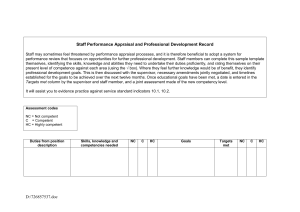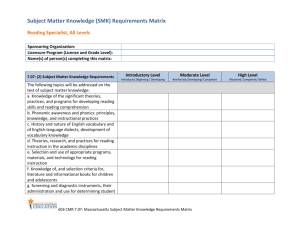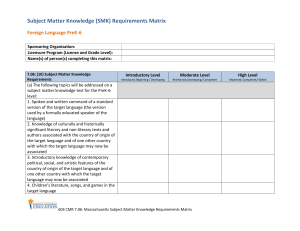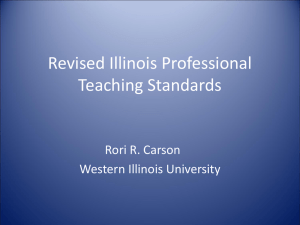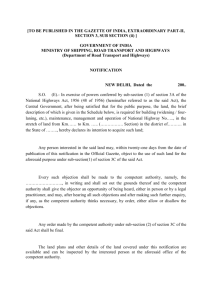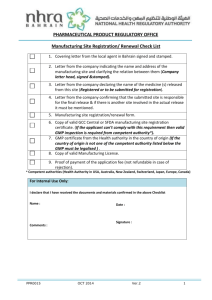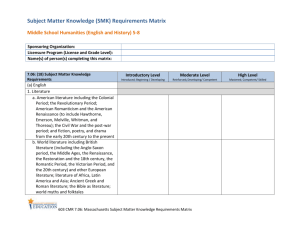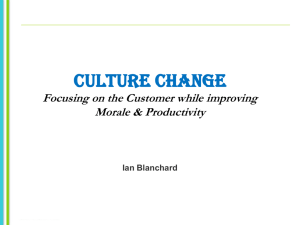COMPETENCE: COMPLIMENT OR CURSE? By Melody Waller LaPreze, Ph.D.
advertisement
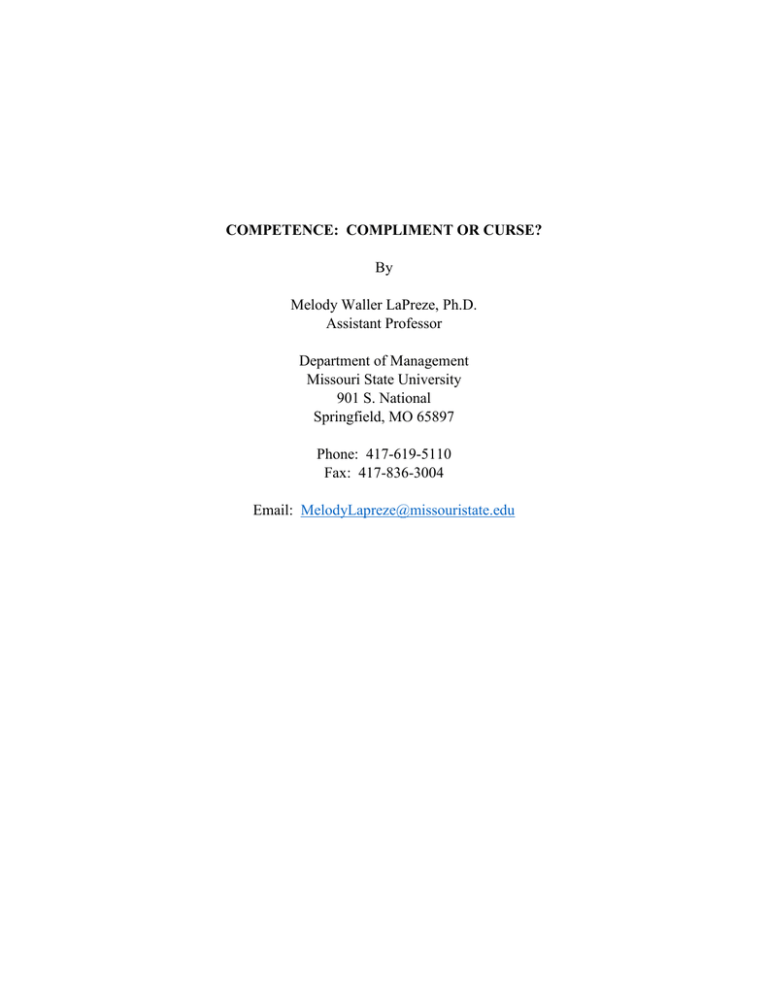
COMPETENCE: COMPLIMENT OR CURSE? By Melody Waller LaPreze, Ph.D. Assistant Professor Department of Management Missouri State University 901 S. National Springfield, MO 65897 Phone: 417-619-5110 Fax: 417-836-3004 Email: MelodyLapreze@missouristate.edu Abstract When employees are given a task more difficult than their peers and told it was because they were the best, i.e. the most competent, is this a curse or a compliment? Examples of this scenario are provided. The competent employee is an employee that has command of above-average ability, or performs at above the minimum required to retain a position in the company or social unit. The opposite of competence is incompetence, which would imply a lack of ability. However, just because an employee is not chosen for a particular task because he is not considered to be the best, or the most competent should not mean he is incompetent. Acknowledging that some will have better skills, more competence, than others, for purposes of this discussion, the less-than-competent employees will not be tagged “incompetent,” or “subcompetent,” because they are not; they will be referred to as “average” employees. They could easily be called “typical,” or “normal,” just not “above normal” as then they would fall into the competent category. Multiple arguments for whether being identified by a supervisor as a competent employee is a compliment or a curse are explored. The discussion of these arguments draws upon elements of equity theory, and leadership concepts such as Graen’s LMX theory for support and explanation. Finally, implications for managers are discussed. Managers who are striving to keep the competent employees satisfied with their jobs and continue their willingness to exert competent and above-and-beyond performance need to be aware of their actions, compare job assignments and requests of employees, and attempt to be fair when working with all employees—competent and average employees alike. Competence: Compliment or Curse? “Joe, this is Bill. We have a bit of a situation and we need your help. We are calling in you and Sue because the job is going to be tricky and we need you because you’re the best.” So, these employees were given a task more difficult than their peers and told it was because they were the best, i.e. the most competent. Is this a curse or a compliment? Concept of the Competence On January 12, 2014, a Southwest Airlines flight mistakenly landed at a rural Missouri airport rather than at the Branson Airport. This meant bringing a 737 to a very quick stop on a runway less than half the length of the intended runway. The erroneous landing ended miraculously without incident as the pilots were able to bring the plane to a stop before it went over the dropoff at the end of the very short runway. However, this pilot error now meant that Southwest Airlines had a very large plane on a very short runway that it needed to get out of there. So, as a manager of pilots at Southwest you have a choice—do you have the original flight crew fly the plane out of there and correct their own mistake (or possibly to make yet another error), or do you bring in another flight crew—presumably a more competent one. The choice was made to bring in a second flight crew. So, the new flight crew was given the task of getting a 737 in the air using an airstrip measuring just 3,378 feet rather than the larger, and easier, takeoff from an airstrip of 7,140 feet. The chance of failure was considerably higher, the task was obviously more difficult, and therefore, Southwest Airlines brought in one of its most qualified and competent flight crews to accomplish this job. Was this a compliment to the flight crew, or a curse in setting them up to fail, or at least have to work pretty hard to correct someone else’s error (Mouawad 2014)? This type of a scenario is not an isolated one. If the group is a difficult one to lead, a more competent leader is put in charge; if the project is going to require a great deal of detailed research, the best researcher is assigned; if the report is one that is going to be read by very high principals of the organization, the best writer is given the task as the final report must be of above-average quality. So, these employees that are considered the best, or the most competent, are assigned more difficult tasks than other “average” employees. And, this phenomenon happens early. Which student does the teacher “put in charge” if she is called out of the classroom unexpectedly; or who is assigned to lead the class to the lunchroom or down the hallway—the competent one or the problem student? Is this the curse of competence or the compliment of competence? The answer to this question depends on many variables, including the assigning supervisor, the employee, and even the colleagues of the employee. Definitions: Competence and Absence of Competence Competence is defined by Merriam Webster on-line dictionary (2014) as “the ability to do something well.” This implies, by the inclusion of the word “well,” an above-average ability to accomplish a task. Thus, the competent employee is an employee that has command of aboveaverage ability, or performs at above the minimum required to retain a position in the company or social unit. The opposite of competence is incompetence, which would imply a lack of ability. However, just because an employee is not chosen for a particular task because he is not considered to be the best, or the most competent should not mean he is incompetent. Hopefully, the organization has a human resources system of review and response such that the incompetent employees have been removed or fired, leaving only employees who are capable of performing the required tasks. Yes, some have better skills, more competence, than others. So, for purposes of this discussion, the less-than-competent employees will not be tagged “incompetent,” or “sub-competent,” because they are not; they will be referred to as “average” employees. They could easily be called “typical,” or “normal,” just not “above normal” as then they would fall into the competent category. So, the continuum of employees would be incompetent/fired, average, competent on the scale of worst to best employees. (Where’s a graphic when you need it?) Arguments for Compliment To say that the boss chooses the employee he perceives to be the best or the most competent when assigning a challenging assignment is common. Also, it is probably very safe to say or believe that the boss does not consider this a punishment, but rather he considers this a compliment, i.e. I chose you for this because I needed the best and that is you. So, the first argument for being identified as Competent is a Compliment is: the boss considers you the best and that is a vote of confidence. This is the organizational equivalent of “being special” or a “chosen one.” One management theory that supports this distinction of being “chosen” is Graen’s LeaderMember Exchange Theory where a small, select group is identified by the leader as the cadre (Graen and Uhl-Bien 1995). Is the cadre also somewhat synonymous to “the competent ones”? Just like an employee’s peers perceive membership in the cadre as a job perk, leading to the receipt of the best—assignments, schedules, work facilities, etc. This is a second argument for being identified as Competent is a Compliment—peer perception of specialness. McClelland’s theory of needs identifies one human need as the Need for Achievement, defined as the need to excel or achieve at the higher end of a set of standards (McClelland 1961). If an employee has a high need for achievement, the identification of competent would help satisfy this need. And the assignment of the difficult task, because you are the best and the best is needed, would be a very positive situation. Hence, the third argument for being identified as Competent is a Compliment—satisfying a Need for Achievement. Arguments for Curse More Work/Same Compensation The concept of competence as a compliment “backfires” if the employee who has been identified as the competent one begins to realize or perceive that the negatives associated with being identified as competent outweigh the perceived perks. When working harder or being assigned to more difficult assignments than the average colleague no longer results in a feeling of being special. The first argument in favor of Competence is a Curse is highly related to compensation. When the competent employee begins to resent doing the additional work required to successfully complete the more challenging assignments while receiving the same compensation as the average colleague, a feeling of being “cursed” occurs. This feeling can be especially intensified if the competent employee discovers, or even perceives, that he is receiving less compensation than the average employee who seems to be doing less and getting more. An example would be two colleagues who are both teaching in the same department. One teacher is considered by the students to be more student-oriented, i.e. popular or competent, and therefore, the enrollment for the popular/competent teacher’s classes is greater than the average, or less popular, teacher. This results in more grading and course administration for the popular teacher for the same compensation—more work and more time for the same compensation. Argument number one for not wanting to be labelled competent—Competence is a Curse. Behavior A vs Behavior B Continuing with the same analogy, the competent or popular teacher is spending more time grading and working with students, which leads to less time for publishing or networking than the average or less popular teacher who has lower class enrollment. If these two employees are at an institution/organization that values and rewards publishing and networking more than teaching, as many do, this further “punishes” the competent/popular teacher. The argument is that employees with fewer responsibilities in the work place, i.e. average employees, can use their time doing more of the higher-rewarded activities. This would lead to the management concept that is you want Behavior A (competence) do not reward Behavior B (average/less than competence). Hence, a second argument that being identified as Competent is a Curse. Teacher’s Pet/Fair-Haired Golden Boy A final argument that being identified as Competent is a Curse involves the variable of the competent employees’ colleagues. When the employees were in school, especially the lower grades, they didn’t call the special/chosen employee “competent,” they called that classmate the “teacher’s pet.” And, it was not a moniker of accomplishment. It was usually a ticket for playground ostracism! The workplace could very possibly still have an element of playground ostracism that has evolved into lunchroom exclusion or less-than-kind comments about being the “fair-haired golden boy.” But, the result is the same—the chosen or competent employee can realize or face an unpleasant workplace, which would lead him to attempt to be less chosen or less competent. Therefore, the final argument is offered that being identified as Competent is a Curse. Implications for Managers Managers who are striving to keep the competent employees satisfied with their jobs and continue their willingness to exert competent and above-and-beyond performance need to be aware of their actions, compare job assignments and requests of employees, and attempt to be fair when working with all employees—competent and average employees alike. Being Aware Being Aware means that managers need to be cognizant of whether they are “guilty” of always assigning the trickiest or more difficult projects to the same person because that individual is perceived by the manager as being the most competent. If the manager is giving the same employee too much work load, he is probably in turn diminishing other employees’ opportunities to prove their competence. This can lead to burnout of the overloaded employee, and frustration on part of the underloaded employee. However, a change in manager behavior may also require a discussion with the previously-identified competent employee. If the competent employee has flourished under the current environment, should the manager suddenly diminish the competent employee’s assignments and “share the wealth” a bit more evenly, the competent employee may consider this a punishment. This new distribution very likely needs to be accompanied with a discussion that the competent employee’s newly-recognized ‘free’ time can be used to pursue other organizational endeavors that will lead the employee to even greater accomplishments and outcomes. This discussion will offer that competent employee a clear vision of how to satisfy his need for achievement, while allowing more equitable opportunities for previously underutilized employees. Being Fair Being Fair accompanies the concept of Being Aware. Managers should strive to avoid “pigeonholing” employees into categories of “the best” and the “not-the-best” groups, or cadre versus hired-hands. As with the implication of Being Aware, when managers are working at being more fair, the concept of work distribution must be addressed and considered. Managers should share the feast and share the famine. Be sure to assign all employees an equal workload and responsibility level. Compare, Compare, Compare Compare the workloads, compare responsibility levels, and compare compensation of all employees. Managers need to refresh their memories of Equity Theory and the concepts of inputs versus outcomes ratios (Adams 1965). When employees perceive that the outcomes they receive as a result of their inputs is equal to the outcomes/inputs ratios of a comparison other, then equity exists and the employee is satisfied and motivated to continue performing at a high level. However, if a competent employee perceives that he is providing a greater amount of inputs, i.e. effort, for the same outcomes, i.e. compensation, of the average employee, the competent employee is not going to perceive that a state of equity exists, and will attempt to eliminate this inequality by either working less, demanding more compensation, or leaving the situation entirely if the inequity is prolonged or perceived as outrageous. All of these scenarios are lose/lose situations for the employee, the manager, and ultimately the organization. Thus, the manager needs to be constantly comparing the outcomes/inputs ratios of various employees, as well as communicating with employees to verifiy the employees’ perceptions of fairness and equity. Many outcomes could be a result of planned inequity; however, the inequity should be of a milder nature or for a shorter duration. If the manager compensates or rewards the competent employee for the greater level of work or responsibility level, that will affect the competent employee’s perception of equity. This extra compensation may also work as a motivator for an average employee to “up his game” to become a competent employee in order to also receive the additional compensation. This would be a type of pay-for-performance style of compensation, which some might say would be a positive idea for the younger generation that many believe to have more of an entitlement attitude. Therefore, when managers compare the equity ratios of their employees and make adjustments accordingly, at least in an individualistic society, the outcomes can be quite positive in terms of rewarding the competent employees and motivating the average employees. Conclusion When a manager consistently asks certain employees to perform the trickiest or more risky and time-consuming jobs, is this label of being competent a curse or a compliment? The old standard answer of “it depends” really is appropriate. It depends on whether the competent employee considers the job a challenge and compliment, or if he resents the extra work. It depends on the attitudes, perceptions, and subsequent behavior of the competent employee’s average colleague, and if the average colleague is motivated to become a “special” competent employee. And, finally, it depends on if the manager is being aware, fair, and willing to compare the work requests with compensation outcomes for individual employees. In a perfect work world Competence is a Compliment, but to some it is still just another “curse” word. References Adams, John. Stacey. 1965. “Inequity in Social Exchanges.” In Advances in Experimental Social Psychology. Ed. L. Berkowitz. New York: Academic Press, 267-300. Graen, George B., and Mary Uhl-Bien. 1995. “Relationship-based approach to leadership: Development of leader member exchange (LMX) theory of leadership over 25 years: Applying a multi level multi domain perspective.” Leadership Quarterly, 6: 219-247. doi: 10.1016/10489843(95)90036-5 McClelland, David C. 1961. The Achieving Society. New York: Van Nostrand Reinhold. Merriam Dictionary online. (2014). Retrieved from: http://www.merriamwebster.com/dictionary/competence?show=0&t=1391543637 Mouawad, Jad. Jan 18,2014. “More Details in Mistaken Landing of a Plane.” The New York Times, B4. Schermuly, Carsten Christoph, Bertolt Meyer, and Lando Dammer. 2013. “Leader-member exchange and innovative behavior. “ Journal of Personnel Psychology, 12(3): 132-134. doi: 10.1027/1866-5888/a000093
